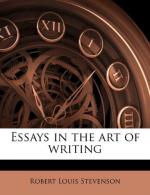I suppose, when I am done, I shall find that I have forgotten much that was most influential, as I see already I have forgotten Thoreau, and Hazlitt, whose paper ‘On the Spirit of Obligations’ was a turning-point in my life, and Penn, whose little book of aphorisms had a brief but strong effect on me, and Mitford’s Tales of Old Japan, wherein I learned for the first time the proper attitude of any rational man to his country’s laws—a secret found, and kept, in the Asiatic islands. That I should commemorate all is more than I can hope or the Editor could ask. It will be more to the point, after having said so much upon improving books, to say a word or two about the improvable reader. The gift of reading, as I have called it, is not very common, nor very generally understood. It consists, first of all, in a vast intellectual endowment—a free grace, I find I must call it—by which a man rises to understand that he is not punctually right, nor those from whom he differs absolutely wrong. He may hold dogmas; he may hold them passionately; and he may know that others hold them but coldly, or hold them differently, or hold them not at all. Well, if he has the gift of reading, these others will be full of meat for him. They will see the other side of propositions and the other side of virtues. He need not change his dogma for that, but he may change his reading of that dogma, and he must supplement and correct his deductions from it. A human truth, which is always very much a lie, hides as much of life as it displays. It is men who hold another truth, or, as it seems to us, perhaps, a dangerous lie, who can extend our restricted field of knowledge, and rouse our drowsy consciences. Something that seems quite new, or that seems insolently false or very dangerous, is the test of a reader. If he tries to see what it means, what truth excuses it, he has the gift, and let him read. If he is merely hurt, or offended, or exclaims upon his author’s folly, he had better take to the daily papers; he will never be a reader.
And here, with the aptest illustrative force, after I have laid down my part-truth, I must step in with its opposite. For, after all, we are vessels of a very limited content. Not all men can read all books; it is only in a chosen few that any man will find his appointed food; and the fittest lessons are the most palatable, and make themselves welcome to the mind. A writer learns this early, and it is his chief support; he goes on unafraid, laying down the law; and he is sure at heart that most of what he says is demonstrably false, and much of a mingled strain, and some hurtful, and very little good for service; but he is sure besides that when his words fall into the hands of any genuine reader, they will be weighed and winnowed, and only that which suits will be assimilated; and when they fall into the hands of one who cannot intelligently read, they come there quite silent and inarticulate, falling upon deaf ears, and his secret is kept as if he had not written.




